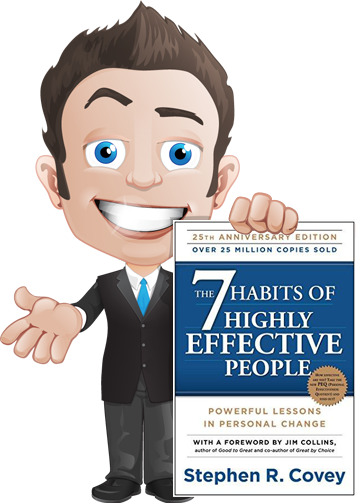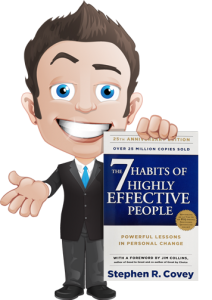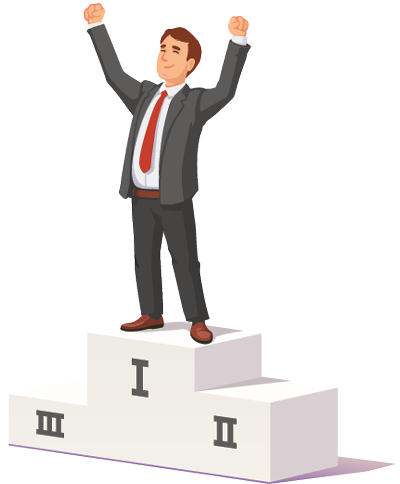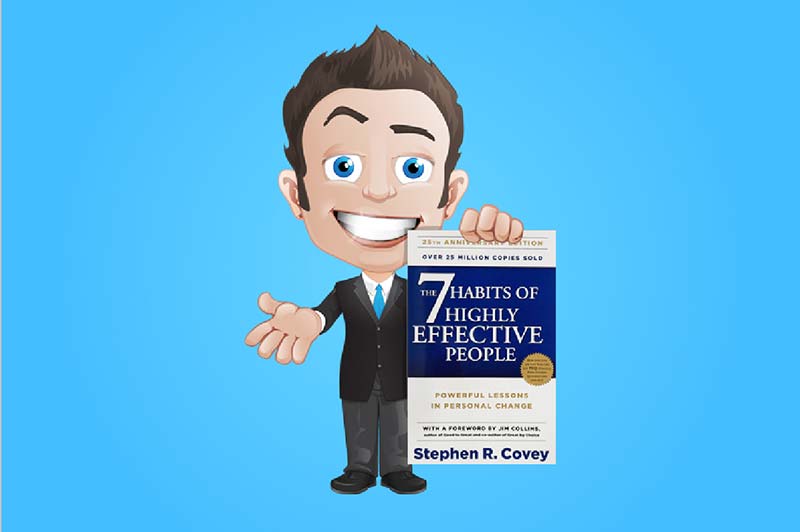The 7 Habits of Highly Effective People
(The Definitive Summary) by Dr. Stephen Covey
The Key Facts & Ideas Explained.
How You Can Improve At Everything (With Just 7 Habits)


Overview
The 7 Habits of Highly Effective People gives you an understanding of how to live a life based on principles.
With every chapter you grow from inside out.
The precious teachings contained here will resonate with you, because they make all the sense in the world, and you’ll notice you can apply them in every aspect of your life. It’s wonderfully written, very clear and easy to understand and incorporate in your life. It will help you with your career, your friendships, and your family.
The Wall Street Journal has called this book “the most influential business book of the century,” and it’s undoubtedly one of the most recognized.
TOP TIP: You’ll want to go back to it every now and then… and when you do…It will always feel right, contemporary and accurate.
Let’s find out….
Summary
1. Dependence is the paradigm of third party care; You support me and tell me what to do and think. If things go wrong, you’re to blame.
2. Independency is the paradigm of me; I’ll look after myself. I’ll decide what to do. I’m responsible.
3. Interdependency is the paradigm of us; Let’s work on this together. Two minds are better than one.
Life is interdependent. If I’m interdependent, I am self-reliant and capable, but I also realize that you and I working together can accomplish far more than I could accomplish alone.
Covey’s first three habits focus on the move from dependency to independency.
Habits 4 to 6 support the move from independence to the advantages of interdependency.
The seventh habit keeps us there.
HABIT 1
BE PROACTIVE
What is proactivity?
7 habits of highly effective people definition, is more than taking initiative. It’s about assuming responsibility for ourselves.

We take the responsibility to make things happen.
Highly proactive people recognize that responsibility. They do not blame circumstances for their behavior. Their behavior is a product of their own conscious choice based on personal values.
A great way to become more self-aware regarding our level of proactivity is to look at where we focus our time and energy.
There are some things over which we have no real control, and others that we can do something about.
Proactive people work on the things they can do something about – Their Circle of Influence.
To take the first steps to proactivity:
- Make a promise — and keep it.
- Set a goal — and work to achieve it.
The power to make and keep commitments to ourselves is the essence of developing the necessary habits of effectiveness. Start with small commitments within your Circle of Influence.
HABIT 2
BEGIN WITH THE END IN MIND
When we set out on a journey, we usually have an idea of where we want to go.

Unfortunately, for many businesses, this is not the case.
Covey puts it succinctly: it’s really easy to get caught up in the busy-ness of life, to work harder and harder at climbing the ladder of success…
Only to discover it’s leaning against the wrong wall.
It is totally possible to be busy — without being very productive.
We develop the product we want to provide, we identify our target market, then organize, finance, R&D, operations, and marketing to meet that objective.
Depending on how well we have the end in mind, will govern whether or not we succeed.
If we don’t take that control, we allow other people and circumstances outside our Circle of Influence, to shape our destiny.
Covey suggests an effective way to begin is to develop a personal mission statement, focussing on what we want to be and do, and the values and principles upon which being and doing are based.
It becomes a personal constitution, the basis for making daily decisions in the midst of the circumstances and emotions that affect our lives.
Start a collection of notes, quotes, and ideas that you may want to use as resource material in writing your personal mission statement.
Break the statement down into the specific role areas of your life, and the goals you want to accomplish in each area.
Ready for Habit 3?
HABIT 3
PUT FIRST THINGS FIRST
When we set out on a journey, we usually have an idea of where we want to go.

Putting first things first, is effective management.
Many tasks and activities in our lives can be urgent. Many can also be important. But not all. Urgent means it requires immediate attention.
Importance, on the other hand, has to do with results:
If something is important, it contributes to our mission, our values, and our goals.
Effective management deals with things that are not urgent, but are important.
There are four key facets of effective management set out by Covey:
- It’s principle-centred.
- It’s conscience-directed.
- It defines our unique mission, including values and long-term goals.
- It helps to balance our life by identifying roles, and by setting goals.
The starting point is, therefore, a commitment to start organizing, meeting the four facets above and creating the fifth facet…
A commitment to do it regularly.
HABIT 4
THINK WIN/WIN
Win/Win is not a technique; it’s a philosophy of human interaction.

Thinking Win/Win is the core of interpersonal leadership. It consists of mutual learning, mutual influence, and mutual benefit.
The principle of Win/Win is fundamental to success in all of our interactions. Character is the foundation of Win/Win, and Covey describes three traits.
Character is the foundation of Win/Win, and Covey describes three traits:
- INTEGRITY. The value we place on ourselves
- MATURITY. The balance between courage and consideration.
- ABUNDANCE MENTALITY. The belief that there is plenty out there for everybody.
Win/Win can only survive in an organization where Win/Win is embedded.
If we talk Win/Win but reward Win/Lose, we’re the ultimate losers.
For Win/Win to work, the planning system, the communication system, the budgeting system, the information system, the compensation system…
All have to be based on the principle of Win/Win.
So let’s identify a relationship where we’d like to develop a Win/Win agreement.
We need to step into the other person’s shoes and write down how we think that person sees the solution. Then list, from our own perspective, what results would constitute a win for us.
Does it fit?
Approach the other person and ask what they think. Is it enough of a starting compromise?
HABIT 5
SEEK FIRST TO UNDERSTAND, THEN TO BE UNDERSTOOD
The key to effective interpersonal communication is to seek first to understand, then to be understood.

According to the 7 habits of highly effective people, when another person speaks, we listen at one of four levels:
- We may be ignoring another person, not really listening at all.
- We may practice pretend listening.
- We may practice selective listening, hearing only certain parts of the conversation.
- We may even practice attentive listening, paying attention and focusing energy on the words that are being said.
…but very few of us ever practice the fifth level, the highest form of listening, empathetic listening – listening with intent to understand.
Empathetic listening is powerful because it gives us accurate data to work with.
Instead of projecting our own perspective and assuming thoughts, feelings, motives, and interpretation, we’re dealing with the reality inside another person’s head and heart.
How do we do it?
According to Covey, empathetic listening involves four developmental stages:
- The first and least effective is to mimic content. Just listen to the words that come out of someone’s mouth and repeat them.
- The second stage is to rephrase the content. This time, we’ve put his meaning into our own words. Now we’re thinking about what he said, mostly with the left side, the reasoning, logical side of our brain.
- The third stage brings our right brain into operation. We reflect feeling. Now we’re not paying as much attention to what he’s saying as to the way he feels about what he’s saying.
- The fourth stage includes both the second and the third. You rephrase the content and reflect the feeling. As we seek to understand, we rephrase content, and reflect feeling, we give him room to express and work through his own thoughts and feelings.
HABIT 6
SYNERGIZE
What is synergy?
Simply defined, it means that the whole is greater than the sum of its parts.

Life is not always binary — there are almost always third alternatives.
When we see only two alternatives (ours and the “wrong” one), we need to look for a synergistic third alternative. If we work with a Win/Win philosophy and seek to understand, we can find a solution that will be better for everyone concerned.
To put synergy thinking into action, engage a person who typically sees things differently than you do.
Consider ways in which those differences might be used as stepping-stones to the third alternative solution.
And finally…
HABIT 7
SHARPEN THE SAW’ PRINCIPLES
Habit 7 is personal, professional development. It’s all about enhancing the greatest asset we have – ourselves.

“Sharpen the saw” means exercising all four dimensions of our nature:
- Physical;
- Spiritual;
- Mental; and
- Social/Emotional,
…regularly and consistently.
The physical dimension involves caring effectively for our physical body: eating the right kinds of foods, getting sufficient rest, and exercising on a regular basis.
Renewing the spiritual dimension provides leadership to your life. The spiritual dimension is your core, your center, your commitment to your value system. It’s a very private area of life, and a supremely important one.
Exposure to the things that inspire and uplift you are critical, as is immersion in great literature or great music.
Most of our mental development comes through formal education. But as soon as we leave school, we lose that discipline.
We don’t do any more serious reading; we don’t think analytically, we don’t write…
Instead, we watch TV or mindlessly browse Twitter and Facebook.
Continuing education is key, and proactive people can figure out many, many ways to educate themselves and keep their minds sharp.
The social and emotional dimensions of our lives are tied together because our emotional life is developed out of our relationships with others.
Renewing our social/emotional dimension does not take time in the same sense that renewing the other dimensions does.
We can do it in our normal everyday interactions with other people. But it definitely requires exercise. We may have to push ourselves to get out and meet people beyond social media.
So there you have it: six habits and a seventh renewal process.
They’re Covey’s key to becoming highly effective, and they work.
Millions of readers can’t be wrong.
Now I would like to hear from you:
What’s your number 1 take away?
Have you been party to the 7 Habits of Highly Effective People training, and if so, what can you share with us?
Or maybe you’ve got a question.
Either way, I would love to hear from you, I’ll be personally responding to all comments and questions that come in.
What’s your number 1 take away or maybe you’ve got a question.
Now I would like to hear from you:
Have you been party to the 7 Habits of Highly Effective People training, and if so, what can you share with us?
Or maybe you’ve got a question.
Either way, I would love to hear from you, I’ll be personally responding to all comments and questions that come in.


